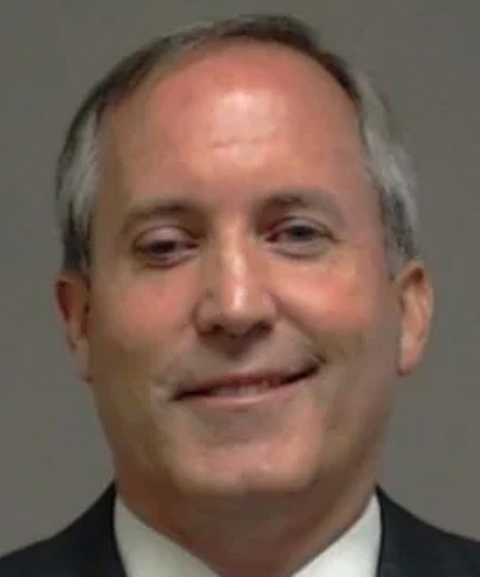
Travis County District Court Judge Maria Cantú today (Friday, March 1) issued a temporary restraining order blocking Texas Attorney General Ken Paxton’s efforts to force PFLAG National to turn over information and documents the organization has related to its support of families in Texas seeking gender-affirming medical care for their transgender children.
 The order came in a lawsuit PFLAG filed Wednesday, Feb. 28, after Paxton demanded the information and documents. Today’s TRO prohibits Paxton from trying to enforce his demand as the lawsuit moves through the courts.
The order came in a lawsuit PFLAG filed Wednesday, Feb. 28, after Paxton demanded the information and documents. Today’s TRO prohibits Paxton from trying to enforce his demand as the lawsuit moves through the courts.
Lambda Legal, the American Civil Liberties Union of Texas, the ACLU, and Transgender Law Center, who filed the lawsuit on behalf of PFLAG National, issued the following joint statement after the judge granted their request for the TRO:
“We’re grateful that the court saw the harm the Attorney General’s Office’s intrusive demands posed for PFLAG National and its Texas members and is protecting them from having to respond while we continue to litigate the legality of the office’s requests. We now will return to court to seek an extended and ultimately permanent block so that PFLAG can continue supporting its Texas members with transgender youth in doing what all loving parents do: supporting and caring for their children.”
In the restraining order, Judge Cantú wrote:
“It clearly appears to the court that unless the defendants are immediately restrained from abusing the Deceptive Trade Practices Act by enforcing or otherwise requiring PFLAG to respond to the Civil Investigative Demand and Notice of Demand for Sworn Written Statement, immediate and irreparable injury, loss or damage will result to PFLAG and its members from the defendants’ wrongful actions. Such injury includes, but is not limited to: harm to the ability of PFLAG and its members to exercise their rights of free speech and association under the First Amendment; harm to the ability of PFLAG and its members to be secure against unreasonable searches under the Fourth Amendment; harm to the ability of PFLAG and its members to avail themselves of the courts when their constitutional rights are threatened; and gross invasions of both PFLAG’s and its members’ privacy in an attempt to bypass discovery stays entered in both Loe v. Texas and PFLAG v. Abbott.
‘Further, the court finds that defendants’ wrongful actions cannot be remedied by any award of damages or other adequate remedy at law.”
The two other lawsuits Cantú mentioned were filed by PFLAG against the state of Texas and Gov. Greg Abbott. In the first, Loe v. Texas, PFLAG and other defendants are challenging the newly-enacted state law banning gender-affirming medical care for transgender minors. PFLAG filed the other lawsuit against Abbott and other state officials to stop Abbott’s executive order forcing workers in the state Child Protective Services offices to investigate families and medical professionals providing gender-affirming care to trans minors for child abuse.
The state supreme court heard oral arguments in Loe v. Texas in January this year but allowed the law to remain in effect. Abbott’s efforts to classify such efforts as child abuse remains enjoined for members of PFLAG as that lawsuit continues to move through the courts.
IN OTHER PAXTON NEWS

Texas AG Ken Paxton
The Hill reports that a state district court judge in Bastrop County has dismissed Paxton’s lawsuit against Yelp, which publishes crowd-sourced reviews about businesses, in which Paxton had accused Yelp of misleading the public by saying crisis pregnancy centers in Texas offer limited services.
Republican Judge Reva Towslee-Corbett dismissed Paxton’s lawsuit with prejudice, meaning it is permanently dismissed and that the dismissal is based on the merits of the case. Judge Towslee-Corbett also granted Yelp’s objection in the case, meaning that she agreed the state of Texas did not have jurisdiction to bring the lawsuit in the first place, according to the Austin American-Statesman.
As The Hill explains, after the U.S. Supreme Court overturned Roe v. Wade, Yelp began notifying users that crisis pregnancy centers in Texas “Typically provide limited medical services and may not have licensed medical professionals onsite.” After Paxton claimed the notice was misleading and filed suit — saying Yelp can’t “mislead” people just because the company disagrees with Texas law — Yelp changed the notice to point out that these crisis pregnancy centers offer neither abortions nor referrals to abortion services, something even Paxton admitted is true.
The American-Statesman notes that “crisis pregnancy centers” or pregnancy resource centers” operate with the intentional goal of trying to convince women not to have an abortion.
Yelp had filed suit on a California federal court trying to have Paxton’s thrown out. That effort was dismissed Feb. 5 by the California court based on Supreme Court precedent preventing federal courts from hearing a case by someone being prosecuted in state court.
When Yelp’s case was dismissed in California, Paxton claimed his office had won “a major victory,” the American-Stateman noted, even those the California court’s ruling also said, “Yelp’s allegations of bad faith” on Paxton’s part “tell a persuasive story.”
In his efforts to censor Yelp, Paxton based his claims on the Texas Deceptive Trade Practices Act, the same law he has used to try and back up his efforts to force PFLAG and at least two out-of-state medical clinics — in Seattle and in Georgia — to hand over to him private medical information and documents related to transgender minors seeking gender-affirming care. So far, courts have at least temporarily blocked all those efforts.
— Tammye Nash
















Sounds like all the judge did was robo sign the proposed TRO instead of considering anything about the merits of the case. Typical in the liberal cesspool of Travis County.